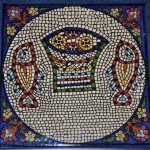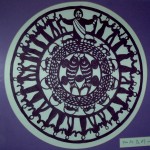 In the story of Jesus feeding the multitude as told in the Gospel of John (6:1-14), Jesus asks Philip a test question: “Where are we to buy bread for these people to eat?” Philip, looks over the crowd, calculates supply and demand, and deems the task economically and logistically impossible.
In the story of Jesus feeding the multitude as told in the Gospel of John (6:1-14), Jesus asks Philip a test question: “Where are we to buy bread for these people to eat?” Philip, looks over the crowd, calculates supply and demand, and deems the task economically and logistically impossible.
Andrew tells Jesus about a boy’s lunch. He does not think two fish and five pita breads will go far.
Philip, Andrew and the multitude are about to get schooled in God’s math. Here is the formula:
5 loaves + 2 fish X God’s blessing = 5,000 lunches with leftovers
God’s math, Jesus teaches, doesn’t add up; it multiplies. God’s math is greater than thesum of its parts. God’s math is abundant, extravagant and generous. With God, the impossible is possible.
John’s gospel refers to the miracles of Jesus as signs because they reveal the true nature of God.
There is so much to see in this sign. First, we see that God cares about people’s physical well-being and their present lives, not just their spiritual health and preparation for eternal life.
In this sign, we see how a small gift can become a transformational offering.
I’m sure Andrew, a Mission Advancement Director for Jesus, considered the five loaves and two fish a small contribution to the lunch fund. Imagine his amazement when he saw the transformation this gift made!
Now that I think of it, the boy’s offering is the edible equivalent of the widow’s mite. He did not tithe his lunch. Assuming Andrew did not snatch the fish and bread, the boy generously gave all that he had.
Alone, our gifts of time and treasure do not go very far. Combined and blessed by God, our offerings of time and treasure fuel God’s mission, exceeding our wildest expectations. Mission Impossible becomes Mission Possible.
Working on a brochure to encourage donations for an accessible swimming pool for SonRise in Anderson, Ind., I learned about two generous gifts.
R., a man with developmental disabilities, is a frequent camper at Lutheran Disability Ministries, now SonRise, a ministry of Bethesda Lutheran Communities. When R. first participated in a camp session, he wanted a friend to join him. At that time, the camp was not a good fit for his friend because he used a motorized wheelchair.
R. invited people to pray for a new, accessible camp. He gave a generous $2 donation to help make the dream of that camp a reality. That $2 was the first gift used to build SonRise Retreat Center.
Last year, an anonymous donor generously offered a $125,000 matching grant to help make the swimming pool at SonRise a reality.
God’s math doesn’t add up, it multiplies. A generous gift of $2 and a generous gift of $125,000 made a transformational difference; both made mission possible.
There’s more to see in this sign, including our role in God’s work. Jesus could have dramatically whipped up a feast without any human offering. I think, though, this would be akin to giving the crowd fish to eat instead of teaching the crowd to share their fish. God calls us, each one of us, to further God’s work in the world.
In this sign we see the Godly importance of community. Why does Jesus want the people to sit down? I think it is to create community. Sitting down, passing the fish and sharing the bread, a crowd of strangers transforms into small groups of neighbors.
In this sign we see the grace of thankfulness. Jesus gives thanks before distributing the meal. We call the prayer before a meal “saying grace,” and we are blessed by this simple act of thankfulness.
Our family table grace goes like this. Holding hands we say, “Come, Lord Jesus, be our guest. Let these gifts to us be blessed. And may there be a goodly share on every table, everywhere.” After the “Amen,” we air kiss twice (mwah, mwah) as we squeeze each other’s hand.
When Annie was in high school, her friend M. was a frequent dinner guest. One evening M. joined us as we entertained Swiss dignitaries from Lutheran World Federation.
We do not let dignitaries stop us from praying “Come, Lord Jesus,” but we do let dignitaries stop us from adding the mwahs after the amen. Paul, Annie and I knew this intuitively; M. did not.
“Amen,” we closed, stopping there. Only M. added “Mwah. Mwah.”
M. insisted we do it again, this time, inviting the dignitaries into full communion with us, mwahs and all.
 From this sign we see the abundant, extravagant hospitality of God. Everyone ate lunch, as much as they wanted. Everyone was welcomed to the feast, including the faithful and the unfaithful, the deserving and the undeserving, the hardworking and the lazy. From this sign we glimpse God’s ecology: nothing and no one is lost. Every thing and every person is useful.
From this sign we see the abundant, extravagant hospitality of God. Everyone ate lunch, as much as they wanted. Everyone was welcomed to the feast, including the faithful and the unfaithful, the deserving and the undeserving, the hardworking and the lazy. From this sign we glimpse God’s ecology: nothing and no one is lost. Every thing and every person is useful.
The leftovers are gathered, enough fragments of bread to fill twelve baskets. I like to think these baskets became a moveable feast taken off the mountain and shared with hungry people in the valley.
Be encouraged, dear colleagues in Christ. God’s math applies to you, too. God blesses our work, gifts us with community, graces us with thankfulness and invites us share life abundant. With God, all mission is possible.
Now to him who by the power at work within us is able to accomplish abundantly far more than all we can ask or imagine, to him be glory in the church and in Christ Jesus to all generations, forever and ever. Amen.
Ephesians 3:20-21 NRSV
Sue Edison-Swift
July 23, 2012

One Response to Loaves + Fish = God’s math